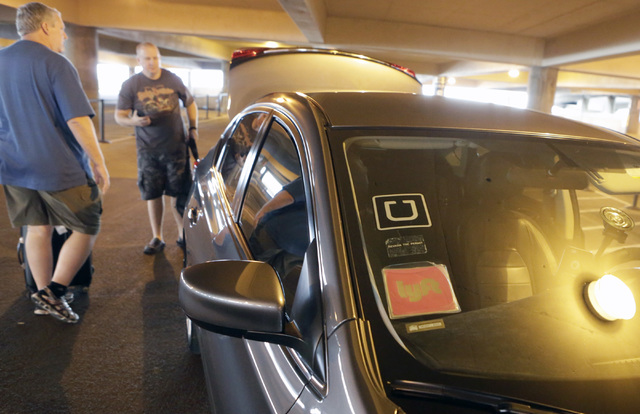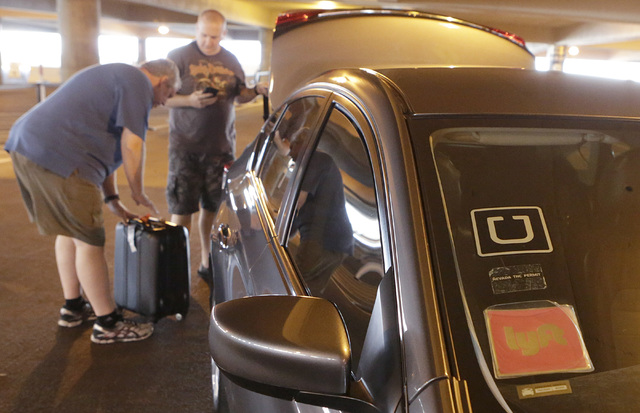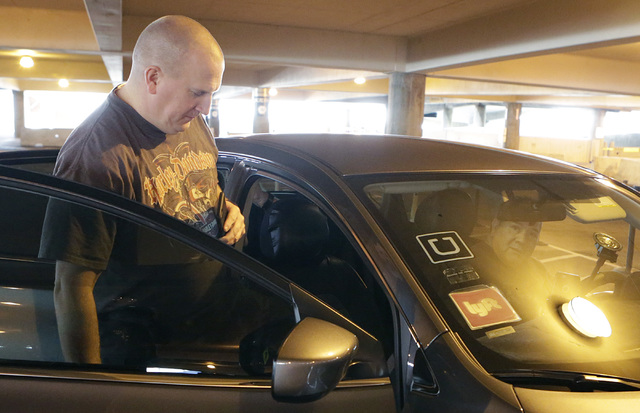Ride-sharing companies power ‘gig’ economy in Las Vegas
The Las Vegas “gig” economy, sparked by ride-sharing services like Uber and Lyft, is growing faster than many other U.S. cities.
That’s according to a recent report from the Brookings Institution, a Washington, D.C.-based think tank.
Miguel Torres, 44, who has been an Uber driver for about four months, said he’s found pros and cons but likes it overall.
Torres, who previously worked in the restaurant industry, considered finding another job outside Uber but found that he has been able to make enough doing it full time.
Torres said he’s noticed an uptick in the number of Uber drivers even in the short period of time he’s been driving.
“You can see the difference from when I started in late May until now,” said Torres.
While he enjoys the flexibility afforded by Uber, Torres said the lack of benefits such as health insurance is an obstacle.
The “gig” economy refers to the jobs made possible by technology that allows contracted workers to connect with clients through apps.
The Las Vegas metro area is among U.S. cities that saw freelance work in the ground transportation industry increase between 2012 and 2014. San Francisco and Austin, Texas — both known for their technology hubs — had the most growth, compared with Detroit and Hartford, Connecticut, which ranked near the bottom.
The Brookings report estimated the growth of “gig” economy workers by analyzing U.S. Census Bureau data through 2014 of “nonemployer firms,” which track mostly self-employed workers.
Mark Muro, a senior fellow and researcher at Brookings, cautioned that the data was likely an undercount and that it only revealed insight into the early years of the “gig” economy, which has continued to expand.
San Francisco-based Uber was founded in 2009 and first came to Las Vegas in 2014. The service was quickly shut down after the company lost a court case challenging it, but resumed operations in 2015 following the passage of a bill that authorized ride-sharing companies.
Muro said the platforms raise big questions in the labor market, such as whether platform freelancing will begin to replace more payroll employment, and whether that employment could end up becoming automated.
In September, Lyft co-founder and president John Zimmer announced a plan to make the majority of its vehicles self-driving within five years.
According to the Brookings analysis, the Las Vegas metro area saw a 105 percent increase in the rides sector of nonemployer firms in Las Vegas between 2012 and 2014.
Brookings estimates that the number of drivers in Las Vegas increased from about 830 in 2012 to about 1,700 drivers in 2014.
According to September 2016 ride-sharing data from Clark County, there were nearly 3,450 licensed Uber drivers and about 3,100 registered Lyft drivers. A Review-Journal review of the county data found that the total number of unique drivers numbered about 4,160 because many drivers are registered under both services. 
Muro said the recent county data appeared to show that Las Vegas residents continued to adopt ride-sharing services at a high rate after 2014.
“It doesn’t seem like the region is near capacity,” said Muro, referring to ride-sharing growth.
Muro added that in Las Vegas, payroll employment increased by 4 percent between 2012 to 2014, an indication that the increase in “gig” jobs didn’t coincide with a decrease in full-time employment.
“So far, they’ve been complements, but going forward, they could begin to cannibalize (other jobs),” said Muro.
In about 15 cities, the increase in “gig” jobs did lead to a decrease in payroll employment, according to the analysis.
The Brookings report also looked at the growth of home-sharing sites like Airbnb, which Las Vegas was also quick to adopt. Measuring the impact of Airbnb was more difficult, researchers said, because renters don’t always report money made from rentals and because many dwellings are being rented by businesses as opposed to individuals.
Contact Alexander S. Corey at acorey@reviewjournal.com or 702-383-0270. Find @acoreynews on Twitter.

































